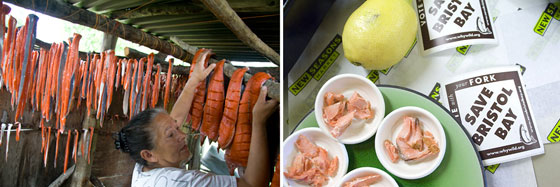Chef Helene Kennan heads to the world’s salmon source – Bristol Bay, Alaska
- by tribe
From left: Alaska Native elders cure salmon in a traditional smokehouse; In Bristol Bay, salmon is on the menu – with a side of conservation messaging.
It’s the time of year when wild salmon migrate from the ocean to freshwater rivers and lakes to spawn. After seagoing journeys that span tens of thousands of miles and last several years, wild salmon use their amazing sense of smell to find the precise place where they were born. It’s here that they lay and fertilize eggs and begin a new cycle of life.
Few places are left on the planet where wild salmon still thrive. But Bristol Bay, in Southwest Alaska, is one of them and that’s where Bon Appétit Management Company chef Helene Kennan is headed this week. Bristol Bay produces the world’s largest sockeye salmon population and is a carefully managed, sustainable fishery that employs thousands of people each year. Wild salmon is an important menu item in Chef Helene’s cafes. She follows Monterey Bay Aquarium’s Seafood Watch guidelines in her sourcing as do all Bon Appétit Management Company chefs.
Helene accepted an invitation from Trout Unlimited Alaska, a program of the nation’s largest coldwater fisheries conservation group, to join several other chefs and food writers from around the country on a culinary adventure to Bristol Bay. The chefs will explore Bristol Bay’s fishing grounds where last summer 40 million adult sockeye salmon returned to spawn. Helene and the group will learn how to pick fish out of set nets located on the beach in Naknek, one of the largest commercial fishing communities in the Bristol Bay region. They will also watch Alaska Native elders running traditional smokehouses where salmon are cured and preserved for the long winter months in Alaska.
In addition to flying to nearby Katmai National Park to watch brown bears cavorting and feasting on salmon, Helene and the crew will also hop in floatplanes and survey a part of the Bristol Bay watershed where foreign mining companies are proposing to build a mega-sized copper and gold mine called Pebble. Trout Unlimited Alaska, along with a coalition of chefs, restaurant owners, seafood consumers and others, are working to protect Bristol Bay from Pebble. If built, the massive open.jpgt mine could threaten the salmon fishery with toxic discharges and habitat destruction.
“Wild salmon is a food that I value and enjoy cooking. Given that Bristol Bay is our nation’s largest wild salmon fishery, I’m concerned about its future. That’s why I’m going on this trip. I want to see and experience Bristol Bay firsthand so that I can share Bristol Bay’s unique story and encourage the food community to help protect Bristol Bay,” said Helene.
The trip isn’t all about observing commercial fishing and exploring Alaska’s wilderness. This being a gathering of chefs and food writers, eating will play a central part of the trip, culminating with a Bristol Bay salmon feast that Helene will help prepare for the group. On the menu is Salmon Tartar with Preserved Lemon Oil and Birch Glazed Salmon Nicoise Salad.
“It’ll be exciting to prepare salmon that I’ve literally watched being pulled out of the water. I’ve worked with seafood for a long time but I have yet to experience the actual sea-to-table process,” she said.
Helene will be in Bristol Bay from June 24 to 27. Watch for an update when Helene gets back. Learn more about Bristol Bay and how you can get involved at www.savebristolbay.org
